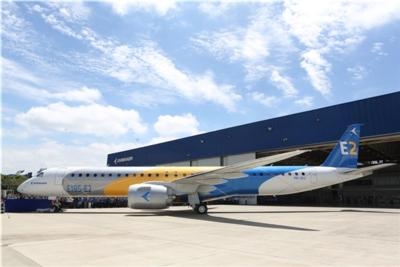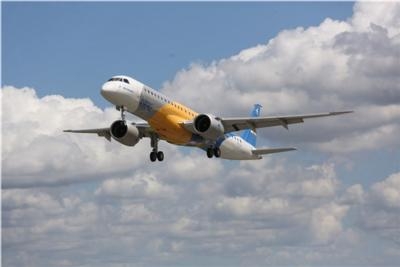Sat, Jul 02, 2022
Test-Flight Results Encouraging
Embraer and Pratt & Whitney have successfully test-flown a GTF-powered E195-E2 aircraft on 100% sustainable aviation fuel (SAF). The test—which was conducted with one of the aircraft’s engines running on 100% SAF and the other operating on petroleum jet-fuel—substantiated the notion that both the GTF engine and the E-Jets E2 families can operate normally on blends of up to 100% SAF.

Prior to its 70-minute test-flight at Vero Beach Regional Airport in Florida, the test-aircraft completed two days of ground tests at Fort Lauderdale International Airport.
All Pratt & Whitney engines and Embraer aircraft are currently certified to operate with up to 50% blends of SAF and standard Jet A/A1 kerosene—according to ASTM International (formerly the American Society for Testing and Materials) specifications.
To maximize the emissions reduction potential of using fuel derived from non-fossil-based feedstocks, future specifications may enable operations on 100% SAF.
The SAF used by Embraer and Pratt & Whitney was 100% hydro-processed esters and fatty acids synthetic paraffinic kerosine (HEFA-SPK) acquired from World Energy. HEFA-SPK is a specific type of hydro-treated, renewable feedstock fuel used in aviation, and is considered a leading alternative replacement for conventional jet fuel by the Commercial Aviation Alternative Fuels Initiative (CAAFI), due to the sustainability of its feedstock. The initiative, however, makes neither mention nor issue of the worrying fact that contemporary production methods utilize 1,300-gallons of fresh water to synthesize a single gallon of sustainable aviation fuel.

Nevertheless, Graham Webb, chief sustainability officer at Pratt & Whitney said of the test: “SAF is a core part of our sustainability roadmap, and we continue to work with industry partners and regulators to support the development of a drop-in standard for 100% SAF.”
Mister Webb’s sentiments were reiterated by Rodrigo Silva e Souza, vice president of strategy and sustainability for Embraer Commercial Aviation, who added: “Embraer and Pratt & Whitney are leading the industry with products that are more efficient for our customers and more sustainable for our society. This test demonstrates that the E2 is ready for 100% SAF certification and operation once the industry finalizes standards.”
More News
He Attempted To Restart The Engine Three Times. On The Third Restart Attempt, He Noticed That Flames Were Coming Out From The Right Wing Near The Fuel Cap Analysis: The pilot repor>[...]
Make Sure You NEVER Miss A New Story From Aero-News Network Do you ever feel like you never see posts from a certain person or page on Facebook or Instagram? Here’s how you c>[...]
From 2009 (YouTube Edition): Leading Air Show Performers Give Their Best Advice for Newcomers On December 6th through December 9th, the Paris Las Vegas Hotel hosted over 1,500 air >[...]
Aero Linx: NASA ASRS ASRS captures confidential reports, analyzes the resulting aviation safety data, and disseminates vital information to the aviation community. The ASRS is an i>[...]
“For our inaugural Pylon Racing Seminar in Roswell, we were thrilled to certify 60 pilots across our six closed-course pylon race classes. Not only did this year’s PRS >[...]
 NTSB Final Report: Rutan Long-EZ
NTSB Final Report: Rutan Long-EZ ANN FAQ: Turn On Post Notifications
ANN FAQ: Turn On Post Notifications Classic Aero-TV: ICAS Perspectives - Advice for New Air Show Performers
Classic Aero-TV: ICAS Perspectives - Advice for New Air Show Performers ANN's Daily Aero-Linx (06.28.25)
ANN's Daily Aero-Linx (06.28.25) Aero-News: Quote of the Day (06.28.25)
Aero-News: Quote of the Day (06.28.25)




